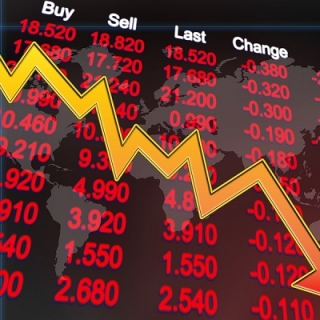


Hong Kong stocks plunged 332 points (-1.3%) to 25,192 in Friday morning trading, extending their decline into a second session. Selling pressure spread across most sectors, particularly financials, technology, and consumer discretionary, as regional risk appetite weakened.
Sentiment was weighed down after Chinese data for July showed industrial output and retail sales below expectations, confirming slowing economic momentum amid persistent external risks, weather disruptions, and weak domestic demand. The surveyed unemployment rate also rose to 5.2%, a four-month high.
Nevertheless, the Hang Seng is still on track for its second consecutive weekly gain, with an increase of more than 1% so far. The boost came primarily from the extension of the 90-day US-China trade truce this week, which eased tariff concerns and boosted market sentiment.
On Wall Street, major indexes hit new records again as expectations for a Fed rate cut in September increased. The positive global sentiment wasn't enough to offset domestic concerns in China, which weighed on Hong Kong stocks today.
On the policy front, Beijing plans to subsidize consumer loan interest rates to encourage household spending and launch a national equipment upgrade initiative to support the cycle. In terms of issuer performance, those lagging behind include Meituan (-3.5%), AIA Group (-3.3%), Sunny Optical (-3.1%), and Geely Auto (-2.7%). (alg)
Source: Newsmaker.id
The Hang Seng Index reversed its downward trend in Hong Kong on Thursday (February 12th), weakening by around 0.9% to around 27,000 after a strong session earlier. This decline halted the momentum of ...
The Hang Seng Index extended its rally for the third consecutive day in the latest trading session in Hong Kong on Wednesday (February 11). The index rose 0.3%, or 83.23 points, to close at 27,266.38,...
The Hang Seng continued to strengthen on Tuesday (February 10th), rising 156 points (0.6%) to close at 27,183. This marked a second consecutive day of gains, with most sectors contributing to the mark...
Hong Kong stocks surged on Monday morning. The Hang Seng Index rose 488 points, or around 1.8%, to 27,051, rebounding after weakening in the previous session. Sentiment was also lifted by Wall St...
The Hang Seng Index weakened 1.2% to close at 26,559.95 in Hong Kong trading on Friday (February 6). This decline brought the Hang Seng Index to its lowest closing level since January 20, after a slig...
Oil prices stabilized on Thursday (February 12th), as the market reassigned a risk premium to US-Iran tensions despite US inventory data showing swelling domestic supplies. This movement confirms one thing: geopolitical headlines are still more...
Gold prices weakened slightly on Thursday (February 12th), as more solid US employment data reduced market confidence in an imminent Federal Reserve interest rate cut. The strong employment data prompted market participants to shift expectations of...
The Hang Seng Index reversed its downward trend in Hong Kong on Thursday (February 12th), weakening by around 0.9% to around 27,000 after a strong session earlier. This decline halted the momentum of the short term rally, as investors began to...